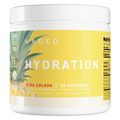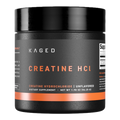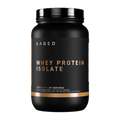If you’ve heard rumors that you should take caffeine and creatine separately, or that one somehow “cancels out” the other, we’re here to dispel the rumor.
Yes, you can take caffeine and creatine together, and many athletes do so safely and effectively.
Both are popular ergogenic aids for athletes. Caffeine is a stimulant and creatine is a muscle fuel. Modern research shows no serious harm (and many benefits) from using them at the same time.
Let’s break down what the science says.
What Do Caffeine and Creatine Do?
Caffeine (from coffee, tea, or supplements) is a stimulant that increases alertness and reduces fatigue.
It blocks adenosine receptors in the brain, which makes you feel more awake and can improve performance.
Studies have found that caffeine can boost maximum strength and muscular endurance, improve sprint and anaerobic performance, and lower perceived exertion during hard exercise. Athletes often use it for that pre-workout “kick.”
Creatine is a molecule your muscles use to rapidly regenerate ATP (the energy currency) during short, intense bursts of effort. Creatine supplementation reliably increases strength and power in workouts lasting less than ~30 seconds. It also tends to help with post-workout recovery and even cognitive tasks. We write about the nitty-gritty of this in this article on how creatine works.
In short, caffeine and creatine work through different mechanisms.
- Caffeine gives you a boost.
- Creatine builds strength behind the scenes.
They do not interact directly together, so there’s no problem taking them together.
Taking Both Together Makes it Convenient
Since creatine and caffeine both provide clear benefits for performance, combining them into one supplement or one stack is often convenient.
In our view, the convenience helps you stick to your supplement routine, which provides results long-term. That outweighs any minor downsides (which the research mostly dispels) of taking them at the same time.
Creatine is usually unflavored, so it makes the most sense to mix into another stack or even your morning coffee.
(Many Kaged pre-workouts include creatine for exactly this reason.)
Myth vs. Fact: Do Caffeine and Creatine Interfere?
A common myth is that caffeine somehow negates creatine’s effects. This idea partly comes from one small 2002 study, which found that short-term caffeine intake prolonged muscle relaxation time, effectively offsetting the faster relaxation from creatine.
In that very specific lab test, caffeine (3 days of intake) slowed muscle fiber recovery, essentially overriding creatine’s shortening of relaxation time. However, this is a very narrow finding about isolated muscle contractions, not a direct measure of athletic performance. In practical terms, most athletes and coaches haven’t found that taking caffeine ruins creatine gains.
More importantly, recent research shows no clear harm from combining them. For example, a 2024 study on male athletes found that taking creatine (as creatine nitrate) together with caffeine enhanced cognitive function (mental focus) and had no adverse effects on performance or health during a week of use. The subjects saw better scores on a mental task when combining creatine and caffeine than with caffeine alone, and importantly, there were no negative side effects reported. This suggests you can stack them for the best of both worlds – physical power and mental alertness – without safety concerns.
A recent systematic review also examined multiple studies of concurrent creatine and caffeine use. It found that creatine loading does not seem to interfere with the acute performance benefits of caffeine.
In other words, taking creatine first, then caffeine before exercise, still gave the expected caffeine boost. The review noted that only in some cases – when caffeine was taken every day during the creatine loading phase – there was a hint that caffeine might blunt some of creatine’s effects. But even then, the evidence was mixed and not conclusive.
For typical users (say, taking 3–5 g creatine daily and a moderate caffeine dose on workout days), there is no strong evidence of a problem.
In fact, a 2024 trial directly tested combining creatine and caffeine (plus bicarbonate) in trained athletes. It found that creatine improved sprint power and caffeine improved time-trial performance, but taking them together did not provide extra benefit above each one alone. Crucially, it didn’t report any worse outcomes from combining them; it simply concluded that “either creatine or caffeine appears sufficient to enhance sprint or short intense exercise performance.”
Again, they work through different mechanisms, so this makes sense.
The takeaway is that taking them together isn’t harmful; it just doesn’t multiply the effect, which is fine because you’re already getting the boost from each.
How to Use Them Together
Timing: There’s no strict rule that you must take them at different times. A common approach is to take your daily creatine dose (3–5 g) at whatever time you remember – e.g. stir it into your pre-workout drink or post-workout shake. Then consume caffeine about 30–60 minutes before your workout to peak its effect (a typical dose is 3–6 mg per kg of body weight, roughly one strong cup of coffee). Many people simply mix creatine powder into their caffeinated pre-workout for convenience, or buy a pre-workout like Kaged Pre-Workout Max that already has 3g of creatine.

Dosage: Stick with standard doses. About 3–5 g of creatine monohydrate (or equivalent HCl dose) per day is enough to saturate muscles. For caffeine, 188–388 mg (depending on your tolerance) is a common dose for performance.
Hydration: Both caffeine and creatine affect hydration. Creatine pulls water into muscles (causing some water weight gain), and caffeine is a mild diuretic. The good news is that when used in realistic amounts, neither causes dehydration if you drink normally. Just be sure to stay hydrated in general. In fact, creatine’s extra water retention in muscles is harmless (it’s all intracellular) and only reinforces the advice to keep sipping water when training.
Does It Matter Which Form of Creatine for Caffeine Interaction?
The form of creatine matters mostly for mixability and comfort, not effectiveness.
Creatine monohydrate is the classic form with the most research behind it, while creatine HCl (hydrochloride) dissolves more easily in water and may cause less stomach upset. Both forms ultimately raise muscle creatine similarly – they just differ in solubility. For details on choosing between monohydrate vs. HCl, see our guide on the subject.
Conclusion
Yes, you can absolutely take creatine and caffeine together. They act on different systems and, for most users, complement each other rather than clash. Caffeine sharpens your focus and endurance, while creatine fuels your strength. Studies have found no dangerous interactions from combining them over days of use. (Older lab studies hint at possible minor effects on muscle relaxation time, but these don’t translate into ruined workouts.) In short, feel free to mix your creatine into that morning coffee or pre-workout smoothie. Just stick to proven doses (3–5 g creatine, moderate caffeine) and focus on training hard and eating well – that’s what really drives results.
For more details on using creatine in pre-workouts, see our blog on Creatine in Pre-Workout. And if you’re choosing a creatine type, check out our article on Creatine Monohydrate vs. HCl. In any case, taking caffeine and creatine together is scientifically sound – so feel confident stacking them in your training routine.
































